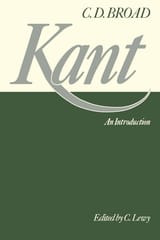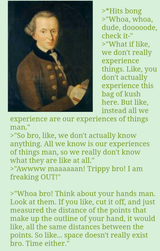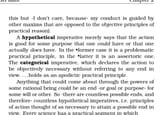>>24527611read the rest of the book if you want more details, this is just a preliminary sketch of the form of transcendental arguments.
also as for the first assumption, this was William James entire rebuttal against Kant, which was to argue that conjunctive relations are inseparable from pure experience itself.
The point is that the "proofs" in the critique rely on contingent premises. Even the fact that space and time are our only intuitions is itself a contingent premise, for Kant himself grant that there could be beings that don't have these two intuitions only. So there is no way to deduce necessarily that these are the only intuitions we have, you have to abstract that fact from your experiences. and furthermore, even the premise that we know something to be true is itself contingent. so nothing Kant says can be apodictic. If you want more details as to the flaws in Kants individual arguments, read the book.



